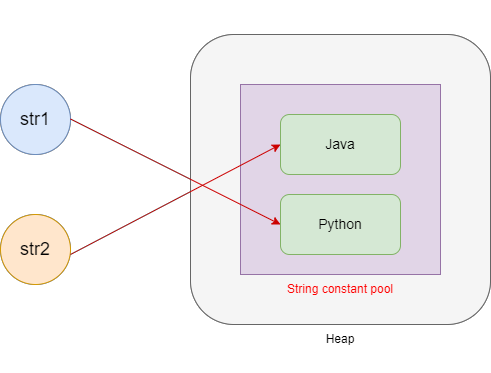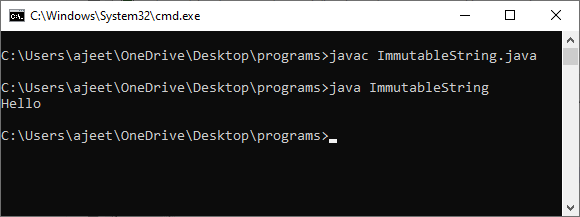Why Are Strings Immutable in Java? Comprehensive Guide for Beginners
Why Are Strings Immutable in Java? Comprehensive Guide for Beginners
Blog Article
Unalterable Strings: A Trick Element in Ensuring Data Uniformity and Integrity
In the realm of information management, the importance of immutable strings can not be overstated. These changeless sequences of personalities play a critical function in upholding the honesty and precision of details within systems. By keeping a state of immutability, data uniformity is made sure, promoting a structure of reliability whereupon essential procedures rely. The concept of immutable strings goes beyond mere triviality; it is a linchpin in the facility web of data governance. As we check out the advantages, application methods, and functional applications of immutable strings, a more clear image emerges of their indispensable nature in protecting the electronic landscape.
The Principle of Unalterable Strings
Immutable strings, an essential principle in programming, refer to strings that can not be changed once they are created. Essentially, as soon as a string value is designated, any type of operation that appears to change the string in fact creates a brand-new string. This immutability guarantees data consistency and dependability in applications, as it avoids unforeseen adjustments to the initial data.
Advantages in Data Consistency

Data uniformity is critical in various elements of software application development, including database monitoring, multi-threaded settings, and dispersed systems (Why are strings immutable in Java?). Immutable strings add substantially to accomplishing this consistency by preventing information corruption due to simultaneous access. In scenarios where several procedures or strings connect with the same information simultaneously, unalterable strings serve as a guard against race problems and synchronization problems
In addition, the immutability of strings simplifies debugging and testing procedures. With unalterable strings, designers can rely on that as soon as a string is established, it will stay the same, making it less complicated to map the resource of errors and ensuring that examination cases generate constant results. This integrity in data dealing with inevitably results in more steady and durable applications.

Applying Immutable Strings
Ensuring the immutability of strings calls for a thoughtful approach to their application in software advancement. As soon as a string item is produced, one crucial strategy is to design string courses in a method that prevents modifications. By making strings unalterable, designers can enhance information uniformity and dependability in their applications.
To implement immutable strings properly, developers should favor developing brand-new string items instead of customizing existing ones. This method guarantees sites that once a string is designated a worth, it can not be altered. Additionally, any procedure that shows up to modify the string must develop a brand-new string with the wanted adjustments rather than altering the initial.
Moreover, making use of immutable strings can streamline concurrency management in multi-threaded environments. Given that immutable strings can not be transformed after production, they can be safely shared amongst multiple threads without the danger of data corruption.
Role in Dependability Guarantee
In software advancement, the use of unalterable strings plays an important function in making sure the dependability of information procedures. Immutable strings, as soon as developed, can not be changed, making certain that the information they stand for stays regular throughout the application's execution. This immutability building supplies a level of guarantee that the data being processed will certainly not be unintentionally changed, leading to unforeseen end results or mistakes in the system.
By including immutable strings right into software application layout, designers can improve the reliability of their applications by lessening the dangers associated with mutable data - Why are strings immutable in Java?. Unalterable strings assist in stopping information corruption or unplanned alterations, which can be particularly vital when taking care of delicate info or when click here for more info information stability is paramount
Furthermore, making use of unalterable strings streamlines concurrent processing, as numerous strings can safely gain access to and share string data without the danger of one string changing the content while one more is reviewing it. This aspect adds considerably to the total reliability of the software system, making certain foreseeable and regular habits in information handling operations.
Applications and System Integration
The smooth combination of unalterable strings into various applications and systems is critical for ensuring robust data uniformity and integrity throughout diverse technological settings - Why are strings immutable in Java?. Unalterable strings play a critical function in boosting the integrity of information exchanges and interactions within complicated software ecosystems. By integrating immutable strings right into applications, developers can minimize the dangers connected with information tampering, unapproved modifications, and inadvertent modifications, therefore strengthening the general security pose of the system
In the context of system assimilation, unalterable strings function as a foundational element for developing safe communication channels and facilitating smooth information transfers in between different parts. Their unalterable nature ensures that information sent in between systems stays proven and the same, minimizing the probability of inconsistencies or errors that can jeopardize the stability of the entire system. Furthermore, unalterable strings can improve interoperability between inconsonant systems by supplying a standard style for sites data depiction, allowing extra efficient information processing and exchange procedures throughout interconnected platforms. By taking on unalterable strings in applications and system assimilation procedures, companies can strengthen their data facilities and support the reliability and uniformity of their details assets.
Final Thought
To conclude, unalterable strings play a vital role in maintaining information uniformity and dependability in different applications and system combinations. By guaranteeing that strings can not be transformed once produced, the stability of data is maintained, decreasing the threat of mistakes and disparities. Carrying out unalterable strings can considerably boost the reliability of systems, inevitably bring about more accurate and reputable information processing.

Report this page